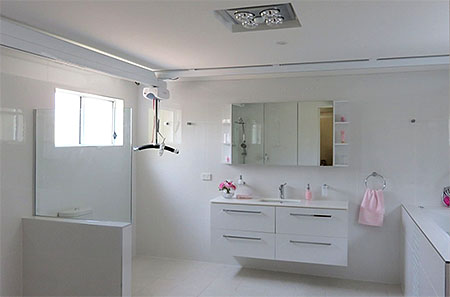Equal Access disbaility access consultants undertake specialised SDA Specialist Disability Accommodation Assessments in accordance with the requirements of the NDIS and NDIA throughout Australia.
Specialist Disability Accommodation (SDA) refers accommodation for participants who are eligible for specialist housing solutions to assist with the delivery of environmental supports to cater for their significant functional impairment and/or meet their very high (support) needs. SDA refers to the homes in which support services are delivered, and may include specific designs for people with very high needs or may be located as such for viable provision of high level support and care to facilitate independent living.

From 1 July 2016, SDA will be funded by the National Disability Insurance Scheme (NDIS; Scheme), with an aim to enable people with disability to have greater choice and control over support services and housing facilities. In Metropolitan Melbourne, the NDIS rollout has already begun in the North East, due to be followed by other districts from 1 November 2017.
The NDIA will determine which NDIS participants will benefit from specialist disability accommodation, by conducting various assessments with references to two sets of criteria:
Those meeting one or both of the above criteria are people with high and/or complex needs, including:
This will include participants with the diagnoses of:

Photo courtesy of CHS Healthcare
To assess whether a participant with high and/or complex needs requires specialist disability accommodation, a range of assessments must be conducted to calculate safety risk, availability of informal supports, and capacity of the participant, just to name a few. The NDIA have advised that it will develop and publish criteria it will apply when determining whether specialist accommodation is necessary for the participant on the basis of their high support needs and other circumstances.
The NDIS Specialist Disability Accommodation Rules 2016 highlight how the NDIA intends to assess the high and/or complex needs of participants:
Part 3.7: SDA Assessment Criteria covers two areas of assessment: whether a participant has extreme functional impairment and also whether a participant has high support needs. The materials that may be used to assess these two areas is clarified in Part 3.9: Materials That May Be Used, which notes any assessment tool specified by the CEO of the NDIA, or any assessments conducted in relation to the participant, such as allied health, behaviour or risk assessments, can be used.
In the past, support needs for people in aged care residential accommodation were formally assessed using a standardised instrument. The Aged Care Funding Instrument (ACFI) tool is used to assess a resident’s needs for care across three care domains: Activities of Daily Living (ADLs), Behaviour (BEH) and Complex Health Care (CHC). The resident’s score in each domain is then used to determine the level of subsidy paid by the Australian Government to service providers for the resident’s care needs. Appraisal is based on questions and assessments, as well as diagnosed health conditions, which are then used to determine an overall classification for their care needs as either low care or high care.
After 1 July 2014, changes to aged care reforms essentially removed the distinction between high and low care for new and existing residents being in permanent residential aged care, in an effort to promote more flexible, simple and transparent arrangements and support an ‘ageing in place’ strategy. However, residents were to continue being assessed under the ACFI tool to determine subsidy amounts provided the Australian Government.
In the conventional process of assessing built environments for compliance to disability provisions, access consultants consider the profiles and needs of the occupants who ordinarily use that class of building, including people with disability. Whilst the disabilities considered typically include sensory or mobility impairments, we recognise the limitations of assuming population groups have similar overall needs from the built environment. This assumption is now even more apparent when assessing SDA. Knowledge of specific functional capacity and the environmental support needs of SDA occupants is paramount to prescribing adequate building features, which not only comply to building and premises legislation and regulations, but also compliment the unique needs of residents living in SDA.
 It is evident that determining the high and/or complex needs of occupants in SDA is a complex process. However, it is also an imperative component of assessing building compliance to disability provisions, especially when determining requirements for access for people with disability according to the Building Code of Australia Table D3.1.
It is evident that determining the high and/or complex needs of occupants in SDA is a complex process. However, it is also an imperative component of assessing building compliance to disability provisions, especially when determining requirements for access for people with disability according to the Building Code of Australia Table D3.1.
The implementation of the NDIS has brought about some confusion to NDIS providers and associated professionals on the definition of high care needs when undergoing or conducting assessments for SDA funding.
Providers who are registered with the NDIA for SDA will be required to declare that their infrastructure meets the NDIA specialist built form requirements and the relevant legislation and standards applicable to the state where the accommodation is located. Accredited access consultants can provide assistance to confirm this compliance to the NDIA on behalf of providers, by reviewing proposed and completed works against the SDA minimum design requirements for the ‘High Physical Support’ design category, as set under the NDIS.
It is unlikely, due to the intricate process of determining the high and/or complex needs of NDIS participants, that access consultants will be privy to information regarding the care needs of SDA residents. However, as SDA aims to support people with very high needs, it is important that access consultants are provided enough information to consider the demand of these needs on the built environment to appropriately assess if the SDA infrastructure can appropriately support occupants in relation to the activities conducted therein, along with meeting compliance to building legislation.
It is anticipated, as a future procedure of practice, that the NDIA compile functional capacity profiles of intended occupants in proposed SDA. A profile brief would ideally outline the overall high and/or complex needs of occupants, which could then be considered by access consultants when determining whether SDA infrastructure meets design requirements from not only a building compliance perspective, but also enables fair and equitable use of a building for occupational performance and quality of life for all SDA residents.
References –
Australian Department of Human Services. (2016). Specialist Disability Accommodation – Decision Paper on Pricing and Payments. Retrieved from: https://www.ndis.gov.au/html/sites/default/files/files/SDA/SDA%20Decision%20Paper.pdf
Australian Department of Human Services. (2017). NDIS in Victoria. Retrieved from: https://www.ndis.gov.au/about-us/our-sites/VIC.html#sou
Australian Department of Human Services. (2015). SDA Pricing Payments Framework approved by Disability Reform Council. Retrieved from: https://www.ndis.gov.au/specialist-disability-accommodation
Australian Government Federal Register of Legislation. (2016). National Disability Insurance Scheme (Specialist Disability Accommodation) Rules 2016. Retrieved from: https://www.legislation.gov.au/Details/F2017L00209/Html/Text#_Toc256000041
Australian Institute of Health and Welfare. (2017). Care needs of permanent aged care residents. Retrieved from: http://www.aihw.gov.au/aged-care/residential-and-community-2011-12/permanent-residents/
Australian Government Department of Veterens’ Affairs. (2017). Frequently Asked Questions: Removal of high/low care classification from Residential Care. Retrieved from: https://www.dva.gov.au/health-and-wellbeing/home-and-care/aged-and-community-care/aged-care-reforms/frequently-asked
Further information is available at SDA Consulting Australia